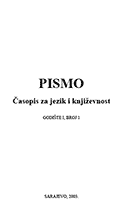Iskazivanje fakto/fikcije u Večernjem aktu Pavla Pavličića ili U potrazi za Bakom iz izgubljene bajke
Expressing facto/fiction in ‘Večernji akt’ by Pavao Pavličić or in search of grandma from the lost fairytale
Author(s): Sanjin KodrićSubject(s): Literary Texts
Published by: Bosansko filološko društvo
Keywords: hrvatska postmoderna; postmoderni roman; fakto/fikcija; metafikcija
Summary/Abstract: In the contribution Expressing facto/fiction in ‘Večernji akt’ by Pavao Pavličić or In search of Grandma from the lost fairytale the author gives an innovative literary-historical and literary-theoretical reading of the novel entitled Večernji akt by Pavao Pavličić, a contemporary Croatian novelist whose opus, according to critics, represents a paradigmatical example of poetics of the postmodern literary generation appearing in Croatia during the seventies of the 20th century. Written at the time of the so-called first Croatian postmodernism, strongly marked by the state of late socialism, Večernji akt appeared as a kind of a crisis novel as well as a novel that re-introduced, and then disintegrated a pessimistic oxymoronic existential reality – facto/fiction. Namely, in short, it is about the idea of a special relationship towards the world and life awaken by Pavličić’s novelistic writing, the idea that assumes that all their phenomena, including the (literary) text itself, are just fictive in man’s perception/reception (which is, in fact, one of general positions of postmodern literature), but fictive in such a way that they are always in a state of constant return to reality, in a state of becoming factive, that one being merely an individual’s desire for power and personal conquest of the world in all its forms, which is an important Pavličić’s innovation triggered by specific late-communistic, post--revolutionary and post-utopistic literary-cultural context of the first Croatian postmodernism. Besides, having been brought to the centre of the thematic focus of the novelistic writing of Pavao Pavličić, the idea of facto/fiction in this writer’s novel realizes itself in several manners, and – conditionally speaking – their possible fundamental genre forms are auto/metaideological, auto/metaartistic, auto/metatextual and, finally, auto/metacultural facto/fictional novel, marked additionally by a string of different ways of subordinated or coordinated positioning of their elements within the given novelistic structure, all depending upon readers’ interpretative key.
Journal: Pismo - Časopis za jezik i književnost
- Issue Year: 2003
- Issue No: 01
- Page Range: 197-210
- Page Count: 14
- Language: Bosnian

